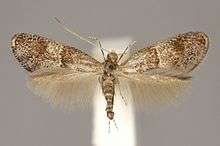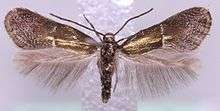Douglasiidae
Douglasiidae is a small Lepidopteran family including around 28 species of micromoth whose adults are collectively called Douglas moths. The largest genus in the family is Tinagma. They are primarily found in the Palearctic (20 spp.) and Nearctic realms.The adults have a 6 to 15 mm wingspan, with a reduced hindwing venation and long fringes. The larvae are leaf miners or borers, primarily in stems and petioles, belonging to Boraginaceae, Labiatae, and Rosaceae.[1]
| Douglasiidae | |
|---|---|
 | |
| Tinagma perdicella | |
 | |
| Klimeschia transversella | |
| Scientific classification | |
| Kingdom: | Animalia |
| Phylum: | Arthropoda |
| Class: | Insecta |
| Order: | Lepidoptera |
| Clade: | Neolepidoptera |
| Infraorder: | Heteroneura |
| Clade: | Eulepidoptera |
| Clade: | Ditrysia |
| Clade: | Apoditrysia |
| Family: | Douglasiidae Heinemann & Wocke, 1876 |
| Genera | |
|
See text | |
Genera
- Klimeschia Amsel, 1938 Palearctic
- Protonyctia Meyrick, 1932 Ecuador
- Tinagma Zeller, 1839 (=Douglasia Stainton, 1854) Palearctic and Nearctic
- †Tanyglossus [2] Poinar, 2017 Cenomanian, Burmese amber, Myanmar
gollark: I think.
gollark: You can disable that with `set list.show_hidden true`.
gollark: Yep!
gollark: Oh, sandboxing too? Also cool, I guess, though I bet I can get around it.
gollark: <@336834315130503169> Looks useless but cool GUI.
References
- Heppner, John B. (2004), "Douglas Moths (Lepidoptera: Douglasiidae)", Encyclopedia of Entomology, Kluwer Academic Publishers, pp. 720–720, doi:10.1007/0-306-48380-7_1289, ISBN 978-0-7923-8670-4, retrieved 2020-02-23
- Jr, George Poinar (2019-08-09). "A new genus of moths (Lepidoptera: Gracillarioidea: Douglasiidae) in Myanmar amber". Historical Biology. 31 (7): 898–902. doi:10.1080/08912963.2017.1402016. ISSN 0891-2963.
This article is issued from Wikipedia. The text is licensed under Creative Commons - Attribution - Sharealike. Additional terms may apply for the media files.